 “Did it not strike Sonia Gandhi that if Hindus by implication are communal, against whom all Muslims must vote, then an appeal could be made to the Hindus to vote solidly for a party that stood for their interests? Has anyone of the Congress realised that if 20 per cent of the Hindu voters is polarised and as a single bloc vote for the BJP, that party will run way with at least 300 seats in Parliament?” – Dr. M.N. Buch
“Did it not strike Sonia Gandhi that if Hindus by implication are communal, against whom all Muslims must vote, then an appeal could be made to the Hindus to vote solidly for a party that stood for their interests? Has anyone of the Congress realised that if 20 per cent of the Hindu voters is polarised and as a single bloc vote for the BJP, that party will run way with at least 300 seats in Parliament?” – Dr. M.N. Buch
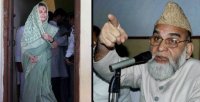 On April 1, Sonia Gandhi is reported to have met Ahmed Bukhari, the Imam of Jama Masjid, Delhi. The meeting obviously had a political purpose, which is to garner Muslim votes with the Imam’s blessings, because immediately after the meeting Sonia Gandhi is reported to have said that in the 2014 general election secular votes must not be split. The context of the statement was so heavily Muslim-oriented that by implication it meant that BJP is communal and a party of the Hindus that, therefore, becomes communal, in contrast with the Muslims who, by definition, are secular. The communal votes should split but the secular votes must remain solidly with the Congress.
On April 1, Sonia Gandhi is reported to have met Ahmed Bukhari, the Imam of Jama Masjid, Delhi. The meeting obviously had a political purpose, which is to garner Muslim votes with the Imam’s blessings, because immediately after the meeting Sonia Gandhi is reported to have said that in the 2014 general election secular votes must not be split. The context of the statement was so heavily Muslim-oriented that by implication it meant that BJP is communal and a party of the Hindus that, therefore, becomes communal, in contrast with the Muslims who, by definition, are secular. The communal votes should split but the secular votes must remain solidly with the Congress.
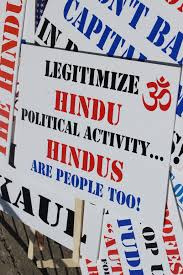 The blatantly communal overtone of the statement, despite denials by the Congress, is horrifying in that it drives a clear wedge between Muslims on the one hand and Hindus on the other. Did it not strike Sonia Gandhi that if Hindus by implication are communal, against whom all Muslims must vote, then an appeal could be made to the Hindus to vote solidly for a party that stood for their interests? Has anyone of the Congress realised that if 20 per cent of the Hindu voters is polarised and as a single bloc vote for the BJP, that party will run way with at least 300 seats in Parliament? Much though it might pain the people who are now offering themselves as champions of secularism, the partition of India was brought about not because Hindus could not live with Muslims but rather because the Muslim League, under the leadership of Mohammed Ali Jinnah, advocated that Muslims could not live together with Hindus. The most secular of all, Mahatma Gandhi, till the very last opposed partition of the country on grounds of religion, going to the extent of advising Jawaharlal Nehru that rather than accept Partition he should offer the prime ministership of a united India to Jinnah. Without going into the merits of the case for Pakistan, the reality is the Muslim League, manifestly and overtly a party representing Muslims, insisted on the creation of a separate nation, whose state religion would be Islam.
The blatantly communal overtone of the statement, despite denials by the Congress, is horrifying in that it drives a clear wedge between Muslims on the one hand and Hindus on the other. Did it not strike Sonia Gandhi that if Hindus by implication are communal, against whom all Muslims must vote, then an appeal could be made to the Hindus to vote solidly for a party that stood for their interests? Has anyone of the Congress realised that if 20 per cent of the Hindu voters is polarised and as a single bloc vote for the BJP, that party will run way with at least 300 seats in Parliament? Much though it might pain the people who are now offering themselves as champions of secularism, the partition of India was brought about not because Hindus could not live with Muslims but rather because the Muslim League, under the leadership of Mohammed Ali Jinnah, advocated that Muslims could not live together with Hindus. The most secular of all, Mahatma Gandhi, till the very last opposed partition of the country on grounds of religion, going to the extent of advising Jawaharlal Nehru that rather than accept Partition he should offer the prime ministership of a united India to Jinnah. Without going into the merits of the case for Pakistan, the reality is the Muslim League, manifestly and overtly a party representing Muslims, insisted on the creation of a separate nation, whose state religion would be Islam.
One is not implying here that the Indian Muslim wants the creation of a theocracy in India. In fact, huge numbers of Muslims opted with their feet for India by refusing to migrate to Pakistan, resulting in India having the largest Muslim population in the world after Indonesia. Since 1947, outbreaks of sporadic communal riots notwithstanding, the Indian Muslim has stayed true to this country. So much so that even after the 1993 riots in Bombay and the 2002 riots in Gujarat, Muslims have not migrated away from either Maharashtra or Gujarat. At the same time, Islam as a religion is openly practised and preached in India, so that there is a distinct Islamic identity to areas inhabited by Muslims. Whereas some people refer to Muslim localities as ghettoes, they are not more so than a Rajput mohalla, a Lohar mohalla or the predominantly Brahmin Kartik Chowk area of Ujjain. In the magnetic field like poles reject but in human relationships like does attract like. To read either secularism or communalism into this would be a travesty. Community groupings by caste, religion or class are to be found everywhere in the world and too much should not be read into it in terms of prejudice or preference.
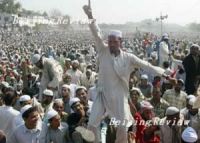 One of the hard facts of electoral politics is that every political party seeks the blessings of particular groups to garner support. It is in this context that the Muslims were always considered a safe group of voters so far as the Congress is concerned. The Left, the socialists and the parties which emerged out of socialist fragmentation, not to mention the Congress, have all tried to persuade the Muslims to vote en masse, not on grounds of acceptance of a particular political philosophy or ideology but as a solid anti-Hindu vote to keep BJP out of power.
One of the hard facts of electoral politics is that every political party seeks the blessings of particular groups to garner support. It is in this context that the Muslims were always considered a safe group of voters so far as the Congress is concerned. The Left, the socialists and the parties which emerged out of socialist fragmentation, not to mention the Congress, have all tried to persuade the Muslims to vote en masse, not on grounds of acceptance of a particular political philosophy or ideology but as a solid anti-Hindu vote to keep BJP out of power.
At the time of the Babri Masjid demolition, the BJP did play a blatantly communal card in seeking Hindu support and this partially worked in favour of the party. Since that date much water has passed under the bridge and no longer can the BJP hope to get Hindu votes in the name of the Ram Temple at Ayodhya. The short point is that the Hindu is not prepared to be politically polarised because he votes on account of the party of his choice, caste factors, class stratification, even region or language. That is why whereas individual caste groups have been targeted as vote banks, the Hindus collectively are not considered a vote bank in the same manner as are the Muslims.
There is a codicil to the above statement. If because of Muslim polarisation brought about by blatantly communal appeals by the Congress and the so-called secular parties, with the Hindus being convinced that this is an anti-Hindu vote rather than an anti-BJP vote, then there can be real trouble because if specifically endangered in this manner there can be some possibility of the polarisation of at least a segment of the Hindu votes. Such communal divide has major law and order implications, but here I am referring only to politics. Sonia Gandhi’s statement, I would respectfully submit, by its blatantly communal appeal has in fact facilitated the polarisation of Hindu votes. Why is the Congress hell-bent on suicide?
!["I do nothing for Muslims or for Hindus, Whatever I do, I do for [all Indians]," says Narendra Modi Modi Quote](https://bharatabharati.files.wordpress.com/2014/04/modi-quote-e1396873080859.jpg?w=200&h=158) The one bright light in this murky scenario is that so far the BJP’s response to such nakedly communal politics is low-key and restrained. The Ram Temple is not brought into focus, there is no mention of Hindutva, there is no appeal to Hindu dharma gurus to come out in favour of the BJP as a party of Hindus. In fact, even Samajwadi Party leader Azam Khan’s highly abusive reference to Narendra Modi—as the elder brother of a puppy—has not attracted abusive counter fire. Development, infrastructure, economic prosperity, national unity are still the key components of the BJP’s election campaign. It is the Congress, Nitish Kumar, Farooq Abdullah and others who refer to Modi as divisive and, therefore, unfit for the prime minister’s post. Those who used violence to advocate Telangana, the Naxalites and the Left-wing extremists, the leaders of the anti-Sikh riots, the sponsors and supporters of and participants in the 1993 Bombay riots are not considered divisive. Only Modi merits that epithet. It is precisely this type and level of politics that has built Modi into someone larger than life.
The one bright light in this murky scenario is that so far the BJP’s response to such nakedly communal politics is low-key and restrained. The Ram Temple is not brought into focus, there is no mention of Hindutva, there is no appeal to Hindu dharma gurus to come out in favour of the BJP as a party of Hindus. In fact, even Samajwadi Party leader Azam Khan’s highly abusive reference to Narendra Modi—as the elder brother of a puppy—has not attracted abusive counter fire. Development, infrastructure, economic prosperity, national unity are still the key components of the BJP’s election campaign. It is the Congress, Nitish Kumar, Farooq Abdullah and others who refer to Modi as divisive and, therefore, unfit for the prime minister’s post. Those who used violence to advocate Telangana, the Naxalites and the Left-wing extremists, the leaders of the anti-Sikh riots, the sponsors and supporters of and participants in the 1993 Bombay riots are not considered divisive. Only Modi merits that epithet. It is precisely this type and level of politics that has built Modi into someone larger than life.
Can we not revert to issue and policy-based politics, bereft of communal innuendos and personal invective? – The New Indian Express, 7 April 2014
» M N Buch, a former civil servant, is chairman, National Centre for Human Settlements and Environment, Bhopal. E-mail: buchnchse@yahoo.com
Filed under: india | Tagged: ahmed bukhari, BJP, communalism, hindu, hindu politics, INC, india, india elections 2014, indian muslims, indian politics, lok sabha election 2014, muslim vote bank, narendra modi, politics, politics of communalism, psychological warfare, religion, sonia gandhi, UPA |















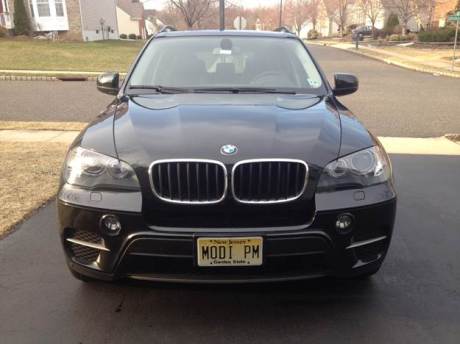
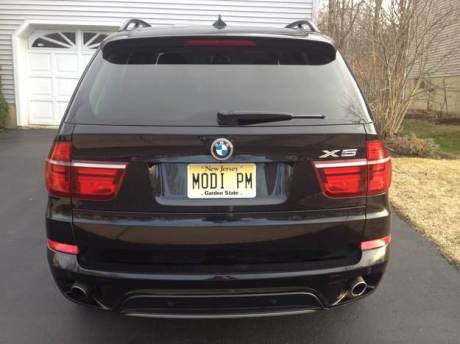










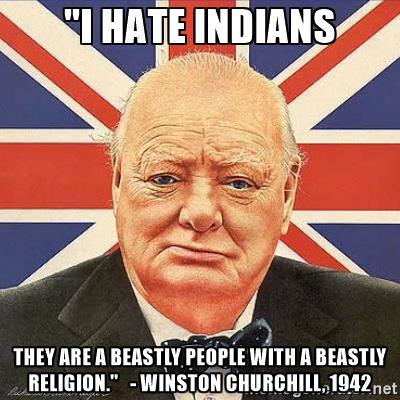
Congress had probably always been over anxious over the whelming majority of the Hindus in a Hindu country. In his ‘The Hindu Phenomenon’ observed that while the Raj first disarmed the Hindu peasantry by 1858, “the concept of secularism meant the moral disarmament of Hindus” in free India. The rot began to spread further with the vote bank politics. Thus, in the name of secularism, Indian politics had always been preoccupied with stark communalism.
LikeLike
Now Hindus know what they must do. If they do not do it, they cannot complain later that they have again got an anti-Hindu ‘secular’ government in place in Dilli!
BJP MANIFESTO HIGHLIGHTS 2014
# The party reiterates its stand to explore all possibilities within framework of Constitution to facilitate construction of the Ram Temple in Ayodhya.
# Reiterating its stand on Article 370 and discussing with all stakeholders for abrogation of the Article.
# Ensuring minimisation of black money and setting up of a task force for this purpose.
# Putting in place strict measures and special courts to stop hoarding and black marketing.
# Setting up a Price Stabilisation Fund.
# Unbundling FCI operations into procurement, storage and distribution for greater efficiency.
# Evolving a single National Agriculture Market.
# Promoting and support area specific crops and vegetables linked to food habits of the people.
# Developing high impact domains like labour intensive manufacturing, tourism, and strengthening traditional employment bases of agriculture and allied industry.
# Harnessing opportunities provided by the upgradation of infrastructure and housing.
# Encouraging and empowering youth for self employment and transforming employment exchanges into career centres.
# Eliminating corruption through public awareness, e-governance, rationalisation and simplification of tax regime.
# Harmonising Centre-state relations by evolving model of national development driven by the states.
# Setting up a Team India initiative which will include the PM and CMs as equal partners.
# Ensure fiscal autonomy of states and creation of regional councils of states of common problems and concerns.
# National Development Council and Inter-state Council will be revived and made into active body.
# Involving state governments in promotion of foreign trade and commerce.
# Greater decentralisation through smaller states.
# Special emphasis on improving connectivity in Northeast region.
# Massive infrastructure development in NE region.
# Complete all pending fencing work along the India-Bangladesh and India-Myanmar border.
# Dealing with insurgency with a firm hand.
#BJP to draft a Uniform Civil Code drawing upon the best traditions and harmonising them with the modern times.
# Foreign policy will be guided through pragmatism and doctrines of mutually beneficial and interlocking relationships.
# Launching a massive Clean Rivers Programme with people’s participation.
# Pursuing friendly relations with neighbours and at the same time not hesitate from taking strong stand when required.
# Reviving the anti-terror mechanism which has been dismantled by the Congress and putting in place swift and fair trial of terror-related cases.
# Insulate intelligence agencies from political intervention and interference.
# Strengthening DRDO and encourage private sector participation including FDI in selected defence industries.
# Strengthening physical infrastructure with expediting work on freight and industrial corridors.
# Setting up of gas grids and national optical fibre network up to the village level.
# Launching of diamond quadrilateral project of high-speed rail network (Bullet trains).
# Setting up of agri rail network catering to needs of perishable farm products.
# Launching of 50 new tourist circuits for the development of tourism.
# Universalisation of secondary school education and skill development and establishment of national e-library.
# Implementation of national education policy. UGC to be restructured and transformed into higher education commission.
# Ensuring urgent steps for safety of migrant workers and communities from Northeast and other states.
# Pursuing an agenda of equal and rapid development of all three regions of Jammu & Kashmir – Jammu, Kashmir and Ladakh.
# Return of Kashmiri Pandits to the land of their ancestors with full dignity and security.
# Evolving further the PPP model into a People-Public-Private Partnership (PPPP).
# Strengthening self-governance and empowering Panchayati Raj institutions with a devolution of functionaries and funds.
# Consolidating Gram Sabha institutions, involving people, in policy formation.
GET THE COMPLETE MANIFESTO HERE
LikeLike